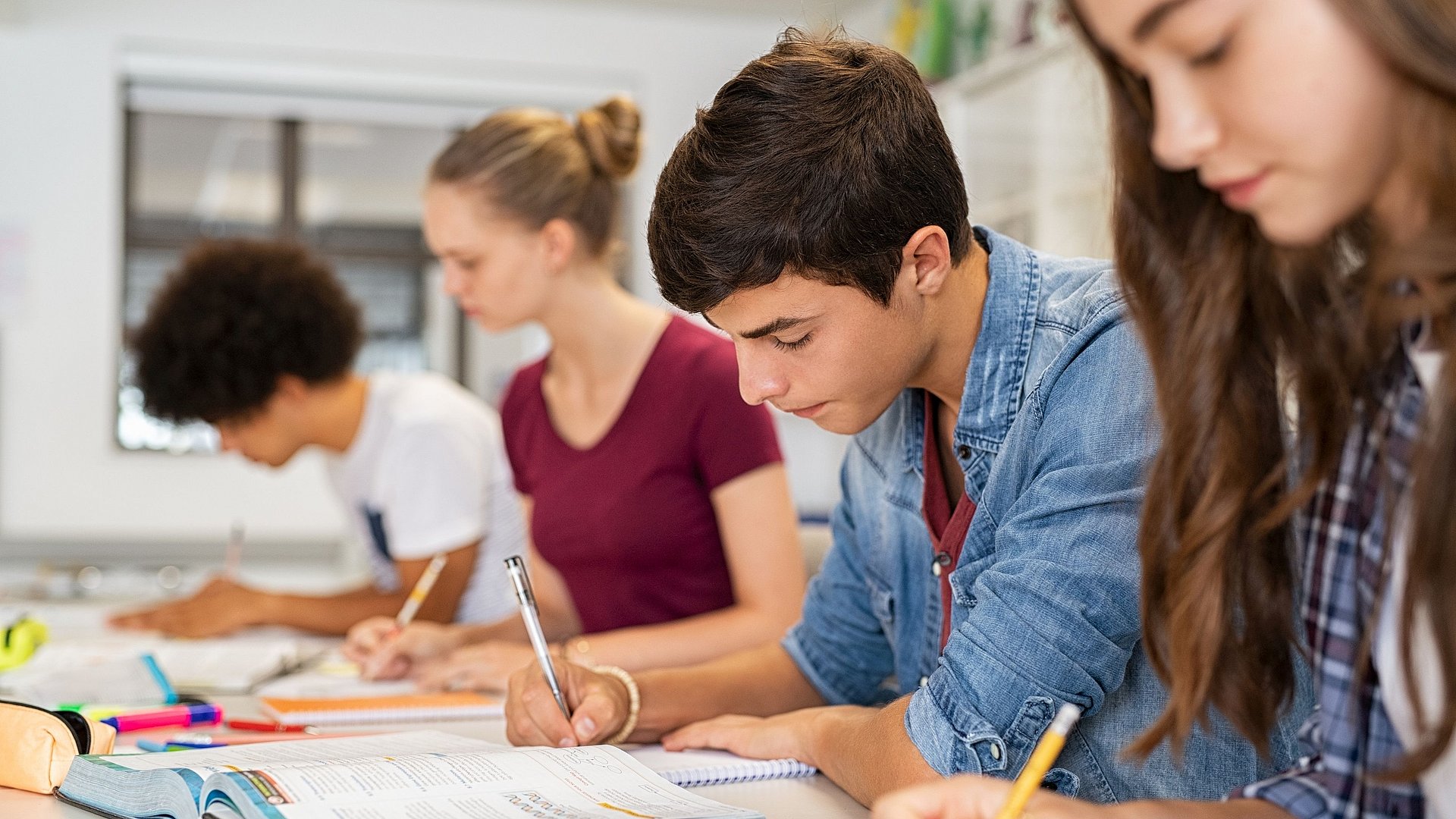Study reveals decline in skills of 15-year-olds since 2018
PISA study: weaker performance in mathematics, reading and science

The PISA studies are a regular assessments of the ability of 15-year-old students to solve problems in mathematics, reading and science in real-world contexts as they approach the end of compulsory schooling. The current study, coordinated by the Organization for Economic Cooperation and Development (OECD) and conducted in Germany by the Center for International Student Assessment (ZIB) at the Technical University of Munich (TUM), was carried out in the spring of 2022.
In many OECD countries the average scores in mathematics and reading skills were lower as compared to the previous PISA study in 2018. Scores were also down in natural sciences, although to a lesser extent.
In Germany the decrease in scores was larger than average in all three subjects. As a result, Germany is now significantly above the OECD average (492 vs. 485 points) only in natural sciences. In mathematics (475 vs. 472 points) and reading (480 vs. 476 points), the results now match the OECD average, which has also fallen in both subjects.
After the first PISA study in 2000, Germany initially achieved improvements in its results and was able to maintain them at a high level. In the most recent PISA rounds, however, there were signs of a negative trend. The scores in mathematics and natural sciences are now below those of the PISA studies in the 2000s, when those subjects were assessed in detail for the first time (mathematics: PISA 2003; natural sciences: PISA 2006). The reading scores of the current study are around the same as in PISA 2000, when that subject was a focal point for the first time.
Only a few OECD countries were able to improve some of their results between 2018 and 2022, for example Japan in reading and Italy, Ireland and Latvia in science. In mathematics, students in Japan and Korea show the highest average performance. The top countries in reading are Ireland, Japan, Korea and Estonia. Japan, Korea, Estonia and Canada have the best results in natural sciences.
Focus of the eighth PISA study: mathematics
In the eighth Program for International Student Assessment (PISA) study, the skills were assessed of a representative selection of approximately 6,100 15-year-old secondary school students attending around 260 schools of all types in Germany. Students also answered a questionnaire about learning conditions, attitudes and social background. School principals, teachers and parents answered questions on the lesson structure, classroom resources and the role of learning in the home. Approximately 690,000 students took part in the study worldwide. Every PISA cycle has a focus subject. This time it was mathematics.
The German part of the study was headed by the ZIB on behalf of the Standing Conference of the Ministers of Education and Cultural Affairs (KMK) and the Federal Ministry of Education and Research. Partners in the ZIB, alongside TUM, are the Leibniz Institute for Research and Information in Education (DIPF) and the Leibniz Institute for Pedagogy of Natural Sciences and Mathematics (IPN).
More students at low proficiency levels
According to the test scores, the study classifies the students in six proficiency levels. Students whose skills do not exceed proficiency level 1 require additional support in order to meet the demands of vocational training or further schooling and participate fully in society.
Around one third of the 15-year-olds achieved only these very low proficiency levels in at least one of the three tested subjects. Around one in six have significant deficiencies in all three subjects. The percentages of these particularly low-performing students have increased significantly since 2018. They now stand at 30% in mathematics, 26% in reading and 23% in science.
At the other end of the scale are the highly proficient students. In mathematics and reading they now represent only 9% and 8% of the total, respectively, while in natural sciences their share of the total remained unchanged, at around 10%.
The pandemic factor
The students’ answers to the questionnaires point to possible reasons for the lower scores: first, the researchers believe that school closures during the COVID pandemic negatively affected the ability to learn skills. In Germany schools made less use of digital media than the OECD average and relied more on materials mailed to students. “By comparison with other countries, Germany was not well prepared for distance learning in terms of digital hardware – but then caught up,” says study head Prof. Doris Lewalter, an educational researcher at TUM and managing director of the ZIB. Fewer than half of the low-proficiency students made use of available remedial options.
However, the analysis of the international data shows no systematic link between the decreases in proficiency between 2018 and 2022 and the duration of school closures. Some countries with relatively few school closure days have significantly lower scores than in 2018 while others, with higher numbers of days lost, show only small decreases or even slightly higher scores.
Language difficulties as a factor
A second possible factor to explain the results in the study’s focal area of mathematics: in Germany there is still a strong link between students’ proficiency in mathematics and the socio-economic status of their families and their immigrant background. Today’s 15-year-olds who themselves have immigrated to Germany are significantly less proficient at mathematics than the same group in 2012, when this question was last investigated. German is spoken less often in the homes of these students than in those of comparable students in 2012.
“This conclusion is only a partial explanation of the overall results, however,” says Prof. Lewalter. “The mathematical scores of non-immigrant students are also lower than in 2012 – and even more so than for German-born children of immigrant parents.”
The factor of interest and motivation
To explain the long-term negative trend, the researchers therefore also take the students’ responses to the questionnaire regarding motivation, attitudes and classroom conditions. Compared to 2012, the students showed less enjoyment and interest in mathematics. The subject was also causing them more anxiety. In addition, the 15-year-olds see fewer potential benefits from learning mathematics.
“The results also show that the students feel less supported by their mathematics teachers. But this support is a key prerequisite for good instruction. In addition, the students have only limited awareness of teachers’ efforts to make lessons relevant to real-world contexts. This makes it more difficult for them to recognize the importance of mathematics in their lives – which can in turn decrease their motivation for the subject,” says Prof. Lewalter.
“A big push”
As key conclusions from the PISA results, the educational researchers recommend:
- a systematic diagnosis and development of linguistic and reading proficiency from pre-school to the secondary level. “German language skills are the foundation of success at school,” says Prof. Lewalter.
- ongoing development of instruction and the inclusion of digital media. “The students’ living realities are constantly changing and, along with them, the baseline conditions for applying mathematics, reading and science skills,” says Prof. Lewalter.
- needs-oriented resource allocation to better equip schools with large numbers of students from disadvantaged families and with immigrant backgrounds.
“After the first PISA study in 2000, Germany was able to significantly improve students’ skills with effective support programs,” says Prof. Lewalter. “With a big push, combining the efforts of policy makers, schools and society, we can do it again.”
Doris Lewalter, Jennifer Diedrich, Frank Goldhammer, Olaf Köller, Kristina Reiss (Hrsg.): PISA 2022. Analyse der Bildungsergebnisse in Deutschland. Münster 2023. DOI: 10.31244/9783830998488
Technical University of Munich
Corporate Communications Center
- Klaus Becker
- klaus.becker@tum.de
- presse@tum.de
- Teamwebsite
Contacts to this article:
Prof. Dr. Doris Lewalter
Center for International Student Assessment (ZIB) at the Technical University of Munich (TUM)
Tel. +49 89 289 24370
pisa@tum.de



